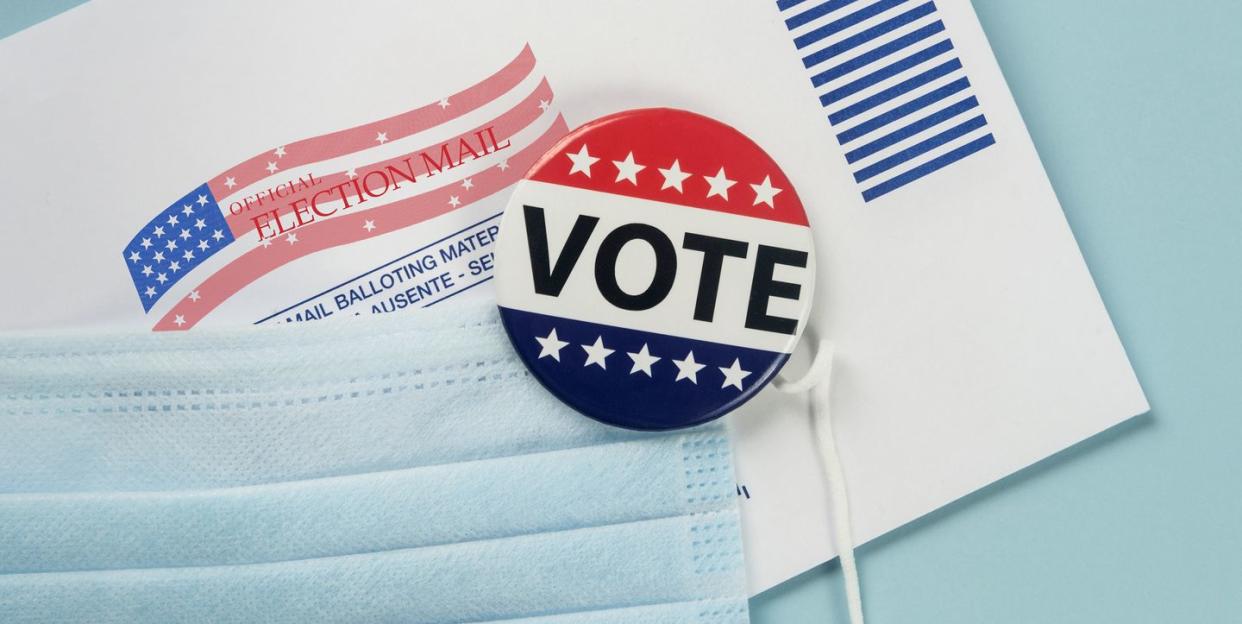How to Vote Safely in Person During the COVID-19 Pandemic, According to Doctors

Election Day (November 3!) is slowly creeping up, and for those who have not voted early or via mail-in ballot yet, there may be a few concerns about how to vote safely in person during the COVID-19 pandemic.
The Centers for Disease Control and Prevention (CDC) quietly rolled out guidelines for voting, including recommendations for people working the polls and those visiting the polls to vote. In the guidance, the CDC specifically says that “elections with only in-person voting on a single day are higher risk for COVID-19 spread because there will be larger crowds and longer wait times.”
As a result, the agency suggests that local facilities offer up a variety of voting options, longer voting periods (through more days or more hours to vote), and consider other options for reducing the number of voters who gather at polling locations at the same time.
In general, the risk of contracting COVID-19 when you vote is “probably on par with going to a grocery store, maybe less so depending on how long you have to stay in line and how crowded it is,” says infectious disease expert Amesh A. Adalja, M.D., senior scholar at the Johns Hopkins Center for Health Security.
William Schaffner, M.D., an infectious disease specialist and professor at the Vanderbilt University School of Medicine, agrees that the chances of getting infected while voting is “likely to be small,” as long as you and the polling place take certain precautions.
So, how can you stay safe while you vote in person? Here’s what you need to know.
COVID-19 safety measures to take before you vote
The CDC recommends that voters do the following before heading to the polls in person:
Look into voting alternatives offered by your state or local election office to help limit the number of people you come into contact with.
Use early voting, if it’s offered, or try to vote at off-peak times, like mid-morning.
Consider watching the voter line from your car and hop in when it’s shorter.
Verify your voter registration information before you head to your polling location.
Have all necessary documents with you to avoid delays.
Finish any registration forms before you arrive at your polling location, if possible.
Review a sample ballot at home to speed the process of casting your vote.
Bring your own black ink pen.
Bring a stylus or similar object to use on touchscreen voting machines. (Just check with poll workers before using it.)
COVID-19 safety measures to take while you vote
There are a few things you can do to keep yourself and those around you safe during the in-person voting process:
Wash your hands well with soap and water before entering the polling station.
Use alcohol-based sanitizer frequently while you’re in the polling station.
Wear a face mask that covers your nose and mouth.
Try to stay at least six feet apart from others.
Do not disinfect or wipe down the voting equipment yourself (electronic equipment can be damaged by cleaners and disinfectants).
Dr. Schaffner also recommends trying this hack: Use hand sanitizer just before you use the voting machine. “You’ll have a little bit of that residual alcohol on your fingertips, and that will help kill the virus, if it’s present, on the front-end as well as the back-end,” he says.
COVID-19 safety measures to take after you vote
After you vote, the CDC recommends that you wash your hands or use alcohol-based hand sanitizer again. Do not touch your face before taking this step. Then, you should be OK to go about your day as usual.
“This is generally the same as going grocery shopping, with maybe a bit more attention paid to where you have to wait in line to vote, how long you have to wait, and washing your hands and/or using hand sanitizer right after voting,” says infectious disease expert Aline M. Holmes, D.N.P., R.N., a clinical associate professor at Rutgers University School of Nursing
And, for what it’s worth, “you would not need to change your clothes when you get home,” Dr. Schaffner says.
Overall, experts recommend taking similar precautions to what you’d take if you were going anywhere else in public. “The risk shouldn’t be very large, and it shouldn’t discourage you from voting,” Dr. Schaffner says. “Voting is very, very important.”
Support from readers like you helps us do our best work. Go here to subscribe to Prevention and get 12 FREE gifts. And sign up for our FREE newsletter here for daily health, nutrition, and fitness advice.
You Might Also Like

